Introduction: Does Coconut Water Go Bad?
In recent years, coconut water has gained immense popularity as a natural and healthy drink. Known for its refreshing taste and numerous health benefits, it has become a go-to beverage for hydration and wellness. But, like many perishable products, does coconut water go bad over time? This is a common question for those who enjoy this tropical drink but want to make sure they’re consuming it at its best.
Understanding the shelf life of coconut water is essential for both consumers and those involved in the production and retail of the product. Whether you’ve purchased a carton of coconut water or harvested it directly from a fresh coconut, knowing how to store it and identify signs of spoilage can save you from unpleasant experiences and potential health risks.
The answer to the question “does coconut water go bad” depends on several factors, including its storage method, whether it’s pasteurized, and the presence of preservatives. Coconut water shelf life varies based on these variables, and it’s important to recognize the different signs of spoilage. In this blog, we will explore how long coconut water lasts, how to properly store it, and the signs to look for to determine whether it’s still safe to drink.
Additionally, we will discuss the difference between fresh coconut water (straight from the coconut) and packaged varieties, as their spoilage timelines can differ significantly. Whether you’re a long-time fan or a newcomer to coconut water, understanding how to keep it fresh and safe is essential to enjoying its full benefits.
What is Coconut Water?
Coconut water is the transparent fluid found within young, green coconuts. Often mistaken for coconut milk, which is made from the flesh of mature coconuts, coconut water is a naturally occurring substance that is known for its hydrating properties. It’s packed with electrolytes, such as potassium, sodium, and magnesium, making it a popular choice for replenishing fluids after exercise or during hot weather.
The process of extracting coconut water is simple: the coconut is tapped, and the water is collected from the center of the fruit. It has a slightly sweet, nutty taste, but it’s much more subtle compared to the rich flavor of coconut milk. Because it is low in calories and high in beneficial nutrients, many people turn to coconut water as a natural alternative to sugary sports drinks and sodas.
In addition to its popularity as a refreshing beverage, coconut water is also used in cooking, particularly in Southeast Asian and Caribbean cuisines. It’s sometimes added to soups, curries, and even desserts, thanks to its light, subtly sweet flavor. As consumers become more health-conscious, the demand for coconut water has surged, with bottled versions available in supermarkets and health stores worldwide.
While coconut water is often marketed as a natural, healthy drink, it’s important to understand that like any other natural product, it can spoil over time. This raises the question: does coconut water go bad? We’ll dive into this crucial topic next, to help you determine how to store coconut water properly and recognize the signs that it has spoiled.
How Does Coconut Water Stay Fresh?
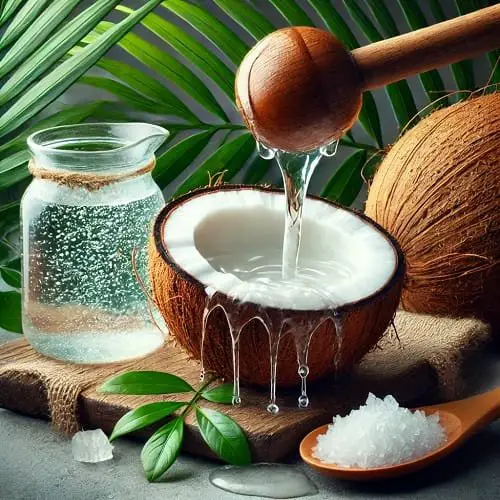
Coconut water is naturally sterile and contains no preservatives, which makes it a great alternative to sugary sodas and energy drinks. Its freshness, however, can be influenced by several factors. When extracted, coconut water is sealed inside the coconut, which helps maintain its freshness until it’s opened. Once removed from the coconut, though, the liquid begins to lose its natural nutrients, flavor, and can eventually spoil.
To maintain freshness, coconut water is often pasteurized, which involves heating it to kill bacteria and extend shelf life. However, even pasteurized coconut water can degrade over time due to exposure to air, light, and temperature fluctuations. The packaging used, such as Tetra Paks or bottles, also plays a crucial role in preserving its quality. Many coconut water brands now offer varieties with added preservatives or artificial sweeteners to further extend shelf life, but these can alter the drink’s taste and nutritional profile.
If you’re wondering, “Does coconut water go bad?”, the answer is yes, though the timing depends on factors such as the processing method, storage conditions, and whether it’s been opened or not. The shelf life of unopened coconut water can last several months, especially when stored in a cool, dry place, but once opened, it must be consumed quickly to avoid spoilage.
Does Coconut Water Go Bad? The Shelf Life of Coconut Water
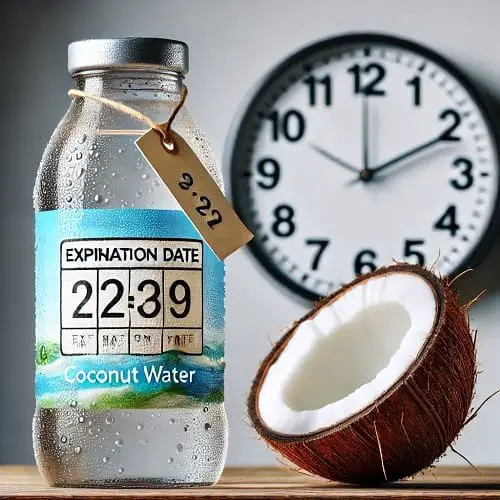
Understanding whether coconut water goes bad depends largely on its storage conditions and whether it has been opened. Fresh coconut water, directly from the coconut, has a very short shelf life and should ideally be consumed within a few hours. As it is a natural product with no preservatives, fresh coconut water can spoil quickly if left at room temperature or not refrigerated.
However, commercially packaged coconut water often has a longer shelf life due to the pasteurization process or other methods like UV treatment, which help extend its freshness. If you purchase bottled coconut water, the expiration date is typically printed on the packaging, giving you an idea of how long it can last. Once opened, even bottled coconut water should be refrigerated and consumed within 3-5 days to avoid spoilage.
The process of pasteurization kills off harmful bacteria but can also affect the flavor, making the taste of store-bought coconut water slightly different from its fresh counterpart. It’s important to note that does coconut water go bad when exposed to air? Yes, oxygen can cause oxidation, leading to changes in flavor and a decline in nutritional value.
Moreover, you can check if your coconut water has gone bad by paying attention to any changes in smell, taste, or appearance. If the liquid becomes cloudy, sour, or has an off-putting smell, it’s a clear indicator that it has gone bad. In such cases, coconut water should be discarded.
Signs That Coconut Water Has Gone Bad
If you’re wondering, “Does coconut water go bad?” the short answer is yes. Even though coconut water is naturally packed with preservatives, it can go bad over time if not stored properly. Several signs can indicate whether coconut water has expired or gone off. The most common indicators are changes in color, texture, and smell.
1. Change in Smell: One of the most obvious signs that coconut water has gone bad is a sour or rancid smell. Fresh coconut water has a mild, slightly sweet fragrance. If it starts to smell fermented, it’s likely that bacteria or yeast have begun to grow, signaling that the coconut water is no longer safe to consume.
2. Change in Color: Fresh coconut water is usually clear or pale, with a slight cloudy appearance. If you notice any significant change in color, such as a yellowish or brown hue, it may be an indication that the coconut water has spoiled. This is particularly true for bottled coconut water, which can undergo oxidation once opened.
3. Taste: If the coconut water tastes off, sour, or strange in any way, it’s a clear sign that it has gone bad. Fresh coconut water should have a slightly sweet, mildly nutty taste. Any bitterness or sourness indicates spoilage.
4. Texture: Another sign of spoilage is a change in texture. If coconut water becomes thick or gelatinous, it is a clear indication that the product has expired.
It’s important to remember that even if coconut water looks or smells fine, you should always check the expiration date if you’re unsure whether it’s still good to drink. Knowing these warning signs can help you avoid drinking spoiled coconut water and help you enjoy its refreshing benefits without worry.
How to Properly Store Coconut Water to Extend Its Freshness
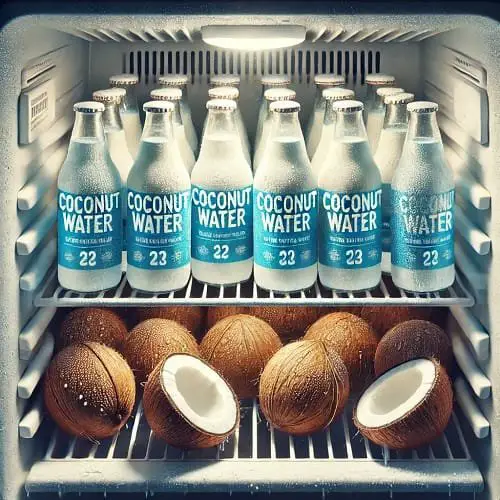
To maximize the shelf life of coconut water, proper storage is essential. Whether it’s fresh or in a bottle, the way you store it can determine how long it stays safe to consume. Fresh coconut water, when extracted directly from the coconut, is most perishable and should be consumed within a few hours. However, packaged coconut water can last much longer, depending on whether it has been opened.
For unopened coconut water, storing it in a cool, dry place—like your pantry—should be sufficient, as it is typically pasteurized to increase its shelf life. Make sure to check the expiration date on the packaging, as this gives you a good indication of how long it can stay fresh.
Once opened, coconut water should be refrigerated to prevent bacteria growth and maintain its freshness. Typically, you should consume it within 7 to 10 days after opening. If you’re unable to finish it within this period, another option is freezing the coconut water. Freezing doesn’t affect the nutritional properties significantly but may alter the texture slightly upon thawing.
If you want to keep coconut water fresh for a longer period, look for Tetra Pak packaging. These cartons help preserve the drink’s taste and nutrients for a longer time, thanks to the packaging’s ability to block out air and light, which helps prevent spoilage.
By following these storage tips, you can significantly extend the freshness of coconut water and reduce the chances of it going bad before you can enjoy it.
ALSO READ
How to Make Rose Water: The Ultimate DIY Guide
Pineapple Cucumber Juice: 5 Powerful Reasons to Supercharge Your Health
How Long Does Coconut Water Last?
The duration for which coconut water lasts depends on whether it is fresh or commercially packaged. Fresh coconut water, typically extracted from young coconuts, has a very short shelf life. Once it’s extracted, it should ideally be consumed within 24 to 48 hours for optimal taste and safety. This is because fresh coconut water doesn’t contain preservatives and can spoil quickly once exposed to air.
On the other hand, commercially packaged coconut water—such as the kind you find in bottles or cartons at the store—has a longer shelf life due to the pasteurization process. Unopened, this kind of coconut water can last anywhere from 6 months to a year, depending on the manufacturing date. However, after it’s been opened, it should be consumed within 5 to 7 days if kept refrigerated. It’s important to check the label for any specific expiration dates or instructions provided by the manufacturer.
Coconut water in the form of dried coconut powder or concentrates can last much longer—often up to a year or more—because these products are dehydrated and require rehydration before consumption.
To summarize, the shelf life of coconut water depends on its form and storage. Fresh coconut water lasts the shortest, while pasteurized and dried varieties have much longer shelf lives. Regardless of the type, always ensure the container is properly sealed and stored in a cool, dry place to extend its longevity.
Can Coconut Water Go Bad After Opening?
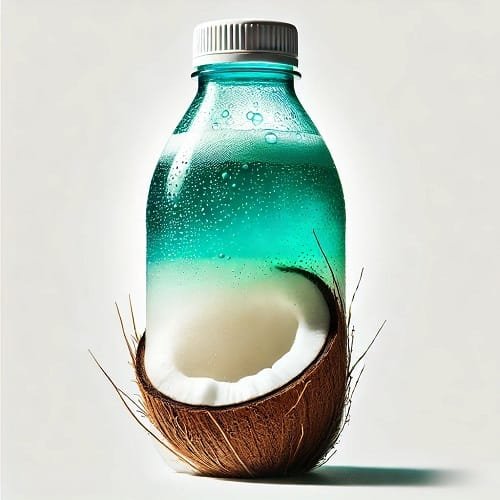
Once you open a bottle or carton of coconut water, the clock starts ticking. While unopened coconut water can last for a long time if stored correctly, opened coconut water is more susceptible to spoilage. This is because exposure to air, bacteria, and contaminants can quickly alter its freshness and taste.
After opening, coconut water can go bad in as little as 24 to 48 hours, especially if not refrigerated. Refrigeration helps slow down the growth of bacteria and preserves the liquid for a longer period. However, even refrigerated coconut water should ideally be consumed within 3 to 4 days to ensure the best taste and safety.
One of the reasons coconut water goes bad so quickly after opening is its high water content and natural sugars, which provide a perfect environment for bacteria to grow. Unlike juices that often contain preservatives, coconut water is typically free from chemicals that prolong shelf life.
If you notice any changes in the smell, taste, or appearance of your opened coconut water, it’s a clear sign that it has gone bad. Sour or rancid smells, cloudy appearance, and off-tastes are all indicators that it should be discarded.
To avoid wasting coconut water, consider portioning it out into smaller containers if you don’t plan to consume it all at once. This can minimize the exposure to air and reduce the chance of spoilage.
How to Tell if Coconut Water Has Gone Bad
If you’re unsure whether your coconut water has gone bad, there are a few signs to look for. Since coconut water is a natural product without added preservatives, it can show visible and sensory indicators of spoilage. Here’s how to tell:
- Smell: The most reliable way to determine if coconut water has spoiled is by smelling it. Fresh coconut water has a slightly sweet, mild aroma. If the scent is sour, rancid, or off in any way, it’s a clear sign that it has gone bad. This happens because bacteria and yeast can grow after exposure to air, causing fermentation.
- Taste: If the smell is still fine, but you’re unsure, taste a small amount. Spoiled coconut water will have a sour or fermented taste, indicating that bacteria have begun to break down the sugars in the liquid. This is a sure sign that it’s no longer safe to drink.
- Appearance: Fresh coconut water is clear, with a slightly cloudy consistency. If you notice any discoloration, such as a yellowish or brownish tint, or if there are visible particles floating in the liquid, this is another indicator that the coconut water is no longer good. It may also become thicker and more viscous as it spoils.
- Expiration Date: Always check the expiration date on the packaging. Even if it hasn’t been opened, coconut water can go bad past this date. While packaged coconut water often lasts a while, consuming it well after the expiration date increases the chances of it going bad.
In summary, coconut water can go bad if it’s not stored properly or kept beyond its shelf life. Using your senses to check for signs of spoilage—like smell, taste, and appearance—can help you avoid consuming expired or spoiled coconut water.
Can You Drink Expired Coconut Water?
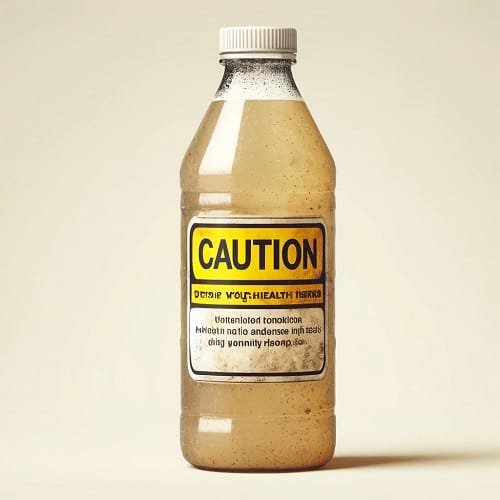
If you’re wondering, “does coconut water go bad?” the expiration date is an important factor to consider. While coconut water has a natural shelf life, consuming expired coconut water may not be ideal. Over time, even if coconut water is past its expiration date, it may still appear normal. However, this doesn’t mean it’s safe to drink. Expired coconut water may have developed a sour taste, off-putting odor, or changes in texture.
Drinking expired coconut water that has been improperly stored or opened could lead to mild digestive discomfort or even foodborne illnesses in some cases. The question of whether coconut water goes bad after its expiration date depends on factors like the way it was stored and how long it’s been past the date. If it’s only slightly expired and shows no signs of spoilage, it may still be safe to consume. However, it’s always a good idea to check for any changes in smell, taste, and appearance.
When in doubt, always prioritize safety and discard coconut water that appears to have gone bad. In general, coconut water can go bad after opening, and even an unopened container might start to lose its freshness past the expiry.
How to Properly Store Coconut Water to Extend Its Freshness
The best way to ensure that coconut water doesn’t go bad too soon is by storing it properly. Whether you’re working with fresh coconut water or a commercial product, proper storage is key to preserving its quality and taste.
Fresh coconut water, once extracted, should be refrigerated immediately. It’s highly perishable, and if left at room temperature for more than a couple of hours, bacteria can begin to grow. Always store fresh coconut water in an airtight container and refrigerate it to extend its shelf life for up to 2-3 days.
For bottled or carton coconut water, does coconut water go bad depends on whether the package is sealed or opened. Unopened coconut water, especially the pasteurized kind, can last for several months or even a year, depending on the expiration date. However, once opened, it should be refrigerated and consumed within 5-7 days for optimal taste and safety. Be sure to check the packaging for any specific storage instructions.
To keep your coconut water fresh, avoid exposure to heat or direct sunlight, as this can cause the water to spoil faster. Freezing coconut water is another option if you want to extend its shelf life—just make sure to store it in freezer-safe containers and thaw it in the refrigerator when needed.
Can Coconut Water Be Frozen to Extend Its Shelf Life?
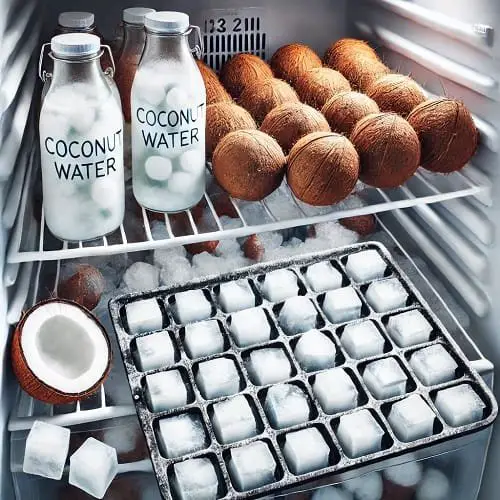
If you’ve ever wondered, “does coconut water go bad” and if freezing is an option, the answer is yes! Freezing coconut water is a practical way to preserve it for longer periods. Coconut water can last for several months in the freezer, provided it’s stored correctly.
To freeze coconut water, just pour it into ice cube trays or containers that are safe for the freezer. Once frozen, coconut water cubes or portions can be stored in airtight bags or containers, helping prevent freezer burn and preserving its freshness. Keep in mind that while the freezing process can extend the shelf life of coconut water, it may slightly alter the texture or taste once thawed. However, it remains safe to consume if properly stored and thawed under refrigeration.
When you want to use frozen coconut water, it’s best to let it thaw in the fridge for a few hours or overnight. Avoid thawing it at room temperature or in the microwave, as this can affect the flavor. Remember that once frozen and thawed, coconut water should be consumed within 1-2 days for the best taste.
FAQs About Coconut Water
1. Does coconut water go bad after opening?
Yes, once opened, coconut water can spoil quickly. Refrigerate it and use it within 5-7 days. If you notice any changes in taste, smell, or appearance, it’s best to discard it.
2. How can I tell if coconut water has gone bad?
Coconut water goes bad when it develops a sour smell, strange taste, or changes in texture. If it’s discolored or has visible mold, it should be thrown away.
3. Can coconut water be stored at room temperature?
You can keep unopened coconut water at room temperature until its expiration date arrives. However, once opened, it should always be refrigerated to prevent spoilage.
4. How long does coconut water last in the fridge?
Opened coconut water should last about 5-7 days in the fridge, while unopened coconut water can last several months until its expiration date.
5. Can coconut water be frozen?
Yes, freezing coconut water is a great way to extend its shelf life. It can be frozen for up to 3-6 months, but the texture and taste may slightly change after thawing.
6. Does coconut water go bad in smoothies?
If you use expired coconut water in a smoothie, it may still mix well with other ingredients, but it could affect the taste. Always check the coconut water for signs of spoilage before adding it to your smoothie.






